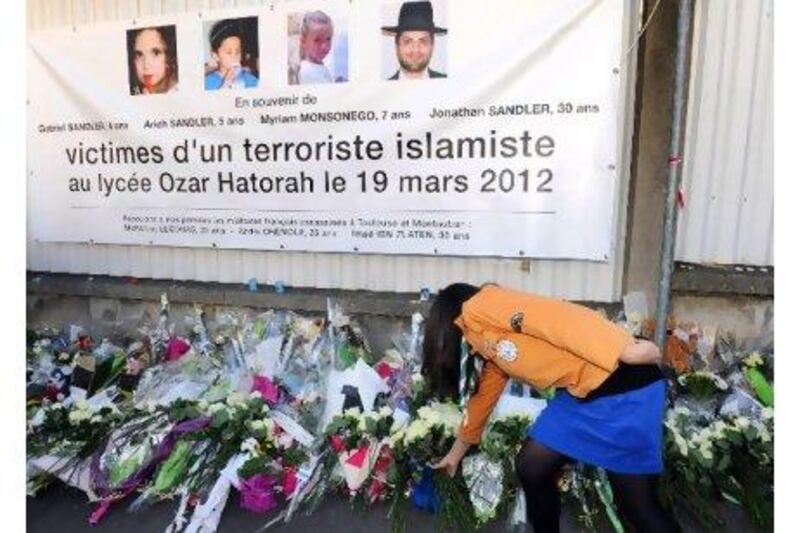MARSEILLE, FRANCE // Mohamed Merah's short but lethal career as a self-proclaimed Islamist warrior, killing soldiers and Jewish children to avenge Palestinians and punish French military involvement in Afghanistan, has focused new attention on France's home-grown extremists.
Murder and martyrdom attract only a handful of French people, mostly in their late teens or early 20s with roots in north Africa, but occasionally drawn from disaffected "indigenous" youth.
But as the case of Merah, born in France to Algerian parents, demonstrates, the small number may include individuals determined and ruthless enough to cause carnage.
Merah, 23, killed three young children and a teacher at a Jewish school in Toulouse, as well as three soldiers of north African origin earlier this month. He was shot dead on Thursday after a 32-hour siege by a special French police unit.
Their attachment to violence is at odds with the views of French Muslim leaders whose unequivocal condemnation of Merah's actions in Toulouse and Montauban commands widespread support within France's large Maghrebin community.
But an unknown number of people born in France or possessing French nationality do travel abroad to study and some not only undergo paramilitary training but also are willing to take action on their return.
French government sources confirmed yesterday that Nicolas Sarkozy, the French president, was acknowledging the existence of such a threat to national security.
Mr Sarkozy wants swift legislation making it punishable by law to frequent violent Jihadist websites or seek combat training overseas.
"It is a problem for western democracy, not just France," one official said. "The UK has similar issues, perhaps greater, with its large community of Pakistani origin, and now many Somalians. The security services do well to prevent planned attacks but even they say they have sleepless nights worrying about all the ways the risk can become reality."
Charges alleging complicity in Merah's crimes on the part of his elder brother, Abdelkader, show the authorities, at least, believe the problem goes deeper than the wayward thoughts and deeds of one man.
The French daily Le Figaro and its weekly magazine examined the tendency of young French people "of Maghrebin origin but also indigenous" to follow a route leading in extreme cases to active involvement in violence.
"You come across them in Salafist bookshops in Sanaa or on the campus of Al Imam University in Riyadh," wrote Georges Malbrunot, a Middle East specialist and the survivor of four months as a hostage in Iraq in 2004.
Dressed in dishdashas, these French missionaries of radical Islam rub shoulders with Americans of Somalian origin, Britons or Malaysians, "often themselves at loggerheads with their societies of origin".
They may not yet be jihadists, but, "in these hives", according to a police officer quoted by Mr Malbrunot, "the risk of mixing with bad company is heightened".
Some need little encouragement. Mr Malbrunot cited the case of a young Parisian lawyer who, radicalised by her partner, abandoned her job to move to Cairo; she told her mother her heroine was Murielle Degauque, a Muslim convert nicknamed the "Belgian baker", who blew herself up in Iraq in a 2005 suicide attack on American forces.
Mathieu Guidère, professor of Islamic studies at Toulouse II-Le Mirail university, said there was no reliable research into the social origins of French "disciples of Bin Laden".
"We know only that these are individuals with strong political conscience and are French citizens or long-term residents," he told Le Figaro. "This makes them all the more difficult to detect because they move around with ease."
Mr Guidère has studied all known cases of French people volunteering for training in Afghan or Pakistani camps or for commando action. All ages were susceptible, he said, but the need to be in good physical condition ensured a majority were under 30.
Action against Al Qaeda since the London and Madrid attacks of 2004 and 2005 had destroyed formal European organisation, Prof Guidère told Le Figaro. Isolated acts by individuals "symbolically claimed for Al Qaeda", but with no logistical support, were now more likely.
His analysis may fit the Toulouse case. Despite telling police he belonged to Al Qaeda, Merah was believed by prosecutors to be a product of "atypical Salafist self-radicalisation".
What part his elder brother played in the process will be for the courts to decide. Abdelkader Merah, 29, has been charged with complicity in murder and conspiracy in connection with a "terrorist enterprise".
A man who shared a prison cell with Mohamed Merah, serving a sentence for petty offences in 2009, id it was clear from Abelkader Merah's demeanour during visits that he was the head of the family.
"At the beginning, he [Mohamed] was very sociable," the former prisoner, given the pseudonym Jeremy, told the French newspaper Journal du Dimanche. "He did favours for everyone, played football … adored cars and motorbikes … and girls wrote to him."
Little by little, "Jeremy" said, his attitude hardened. He listened "from morning to night" to a CD given to him by his brother and containing violent chants and the sounds of explosions.
For his part, Abdelkader Merah has admitted being present when his younger brother stole the scooter used in all three attacks, but denies knowledge of his intentions.
His lawyer, Anne-Sophie Laguens, said he was "outraged" by reports, attributed to officials, that he was proud of his brother's actions. He felt he was being made a scapegoat.







